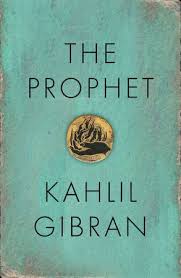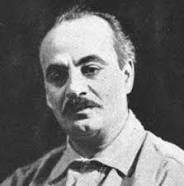The Prophet Page #5
The Prophet is a book of 26 prose poetry fables written in English by the Lebanese-American poet and writer Kahlil Gibran. It was originally published in 1923 by Alfred A. Knopf. It is Gibran's best known work.
Only then shall you know that the erect and the fallen are but one man standing in twilight between the night of his pigmy-self and the day of his god-self, And that the corner-stone of the temple is not higher than the lowest stone in its foundation. 51Then a lawyer said, But what of our Laws, master? And he answered: You delight in laying down laws, Yet you delight more in breaking them. Like children playing by the ocean who build sand-towers with constancy and then destroy them with laughter. But while you build your sand-towers the ocean brings more sand to the shore, And when you destroy them the ocean laughs with you. Verily the ocean laughs always with the innocent. But what of those to whom life is not an ocean, and man-made laws are not sand-towers, But to whom life is a rock, and the law a chisel with which they would carve it in their own likeness? 52What of the cripple who hates dancers? What of the ox who loves his yoke and deems the elk and deer of the forest stray and vagrant things? What of the old serpent who cannot shed his skin, and calls all others naked and shameless? And of him who comes early to the wedding-feast, and when over-fed and tired goes his way saying that all feasts are violation and all feasters lawbreakers? What shall I say of these save that they too stand in the sunlight, but with their backs to the sun? They see only their shadows, and their shadows are their laws. And what is the sun to them but a caster of shadows? And what is it to acknowledge the laws but to stoop down and trace their shadows upon the earth? But you who walk facing the sun, what 53images drawn on the earth can hold you? You who travel with the wind, what weather-vane shall direct your course? What man’s law shall bind you if you break your yoke but upon no man’s prison door? What laws shall you fear if you dance but stumble against no man’s iron chains? And who is he that shall bring you to judgment if you tear off your garment yet leave it in no man’s path? People of Orphalese, you can muffle the drum, and you can loosen the strings of the lyre, but who shall command the skylark not to sing? 54And an orator said, Speak to us of Freedom. And he answered: At the city gate and by your fireside I have seen you prostrate yourself and worship your own freedom, Even as slaves humble themselves before a tyrant and praise him though he slays them. Ay, in the grove of the temple and in the shadow of the citadel I have seen the freest among you wear their freedom as a yoke and a handcuff. And my heart bled within me; for you can only be free when even the desire of seeking freedom becomes a harness to you, and when you cease to speak of freedom as a goal and a fulfilment. You shall be free indeed when your days are not without a care nor your 55nights without a want and a grief, But rather when these things girdle your life and yet you rise above them naked and unbound. And how shall you rise beyond your days and nights unless you break the chains which you at the dawn of your understanding have fastened around your noon hour? In truth that which you call freedom is the strongest of these chains, though its links glitter in the sun and dazzle your eyes. And what is it but fragments of your own self you would discard that you may become free? If it is an unjust law you would abolish, that law was written with your own hand upon your own forehead. You cannot erase it by burning your law books nor by washing the foreheads of your judges, though you pour the sea upon them. And if it is a despot you would 56dethrone, see first that his throne erected within you is destroyed. For how can a tyrant rule the free and the proud, but for a tyranny in their own freedom and a shame in their own pride? And if it is a care you would cast off, that cart has been chosen by you rather than imposed upon you. And if it is a fear you would dispel, the seat of that fear is in your heart and not in the hand of the feared. Verily all things move within your being in constant half embrace, the desired and the dreaded, the repugnant and the cherished, the pursued and that which you would escape. These things move within you as lights and shadows in pairs that cling. And when the shadow fades and is no more, the light that lingers becomes a shadow to another light. And thus your freedom when it loses its fetters becomes itself the fetter of a greater freedom. 57And the priestess spoke again and said: Speak to us of Reason and Passion. And he answered, saying: Your soul is oftentimes a battlefield, upon which your reason and your judgment wage war against your passion and your appetite. Would that I could be the peacemaker in your soul, that I might turn the discord and the rivalry of your elements into oneness and melody. But how shall I, unless you yourselves be also the peacemakers, nay, the lovers of all your elements? Your reason and your passion are the rudder and the sails of your seafaring soul. If either your sails or your rudder be broken, you can but toss and drift, or else be held at a standstill in mid-seas. 58For reason, ruling alone, is a force confining; and passion, unattended, is a flame that burns to its own destruction. Therefore let your soul exalt your reason to the height of passion, that it may sing; And let it direct your passion with reason, that your passion may live through its own daily resurrection, and like the phoenix rise above its own ashes. I would have you consider your judgment and your appetite even as you would two loved guests in your house. Surely you would not honour one guest above the other; for he who is more mindful of one loses the love and the faith of both Among the hills, when you sit in the cool shade of the white poplars, sharing the peace and serenity of distant fields and meadows—then let your heart say in silence, “God rests in reason.” And when the storm comes, and the 59mighty wind shakes the forest, and thunder and lightning proclaim the majesty of the sky,—then let your heart say in awe, “God moves in passion.” And since you are a breath in God’s sphere, and a leaf in God’s forest, you too should rest in reason and move in passion. 60And a woman spoke, saying, Tell us of Pain. And he said: Your pain is the breaking of the shell that encloses your understanding. Even as the stone of the fruit must break, that its heart may stand in the sun, so must you know pain. And could you keep your heart in wonder at the daily miracles of your life, your pain would not seem less wondrous than your joy; And you would accept the seasons of your heart, even as you have always accepted the seasons that pass over your fields. And you would watch with serenity through the winters of your grief. Much of your pain is self-chosen. It is the bitter potion by which the physician 61within you heals your sick self.
Translation
Translate and read this book in other languages:
Select another language:
- - Select -
- 简体中文 (Chinese - Simplified)
- 繁體中文 (Chinese - Traditional)
- Español (Spanish)
- Esperanto (Esperanto)
- 日本語 (Japanese)
- Português (Portuguese)
- Deutsch (German)
- العربية (Arabic)
- Français (French)
- Русский (Russian)
- ಕನ್ನಡ (Kannada)
- 한국어 (Korean)
- עברית (Hebrew)
- Gaeilge (Irish)
- Українська (Ukrainian)
- اردو (Urdu)
- Magyar (Hungarian)
- मानक हिन्दी (Hindi)
- Indonesia (Indonesian)
- Italiano (Italian)
- தமிழ் (Tamil)
- Türkçe (Turkish)
- తెలుగు (Telugu)
- ภาษาไทย (Thai)
- Tiếng Việt (Vietnamese)
- Čeština (Czech)
- Polski (Polish)
- Bahasa Indonesia (Indonesian)
- Românește (Romanian)
- Nederlands (Dutch)
- Ελληνικά (Greek)
- Latinum (Latin)
- Svenska (Swedish)
- Dansk (Danish)
- Suomi (Finnish)
- فارسی (Persian)
- ייִדיש (Yiddish)
- հայերեն (Armenian)
- Norsk (Norwegian)
- English (English)
Citation
Use the citation below to add this book to your bibliography:
Style:MLAChicagoAPA
"The Prophet Books." Literature.com. STANDS4 LLC, 2025. Web. 23 Feb. 2025. <https://www.literature.com/book/the_prophet_240>.








Discuss this The Prophet book with the community:
Report Comment
We're doing our best to make sure our content is useful, accurate and safe.
If by any chance you spot an inappropriate comment while navigating through our website please use this form to let us know, and we'll take care of it shortly.
Attachment
You need to be logged in to favorite.
Log In